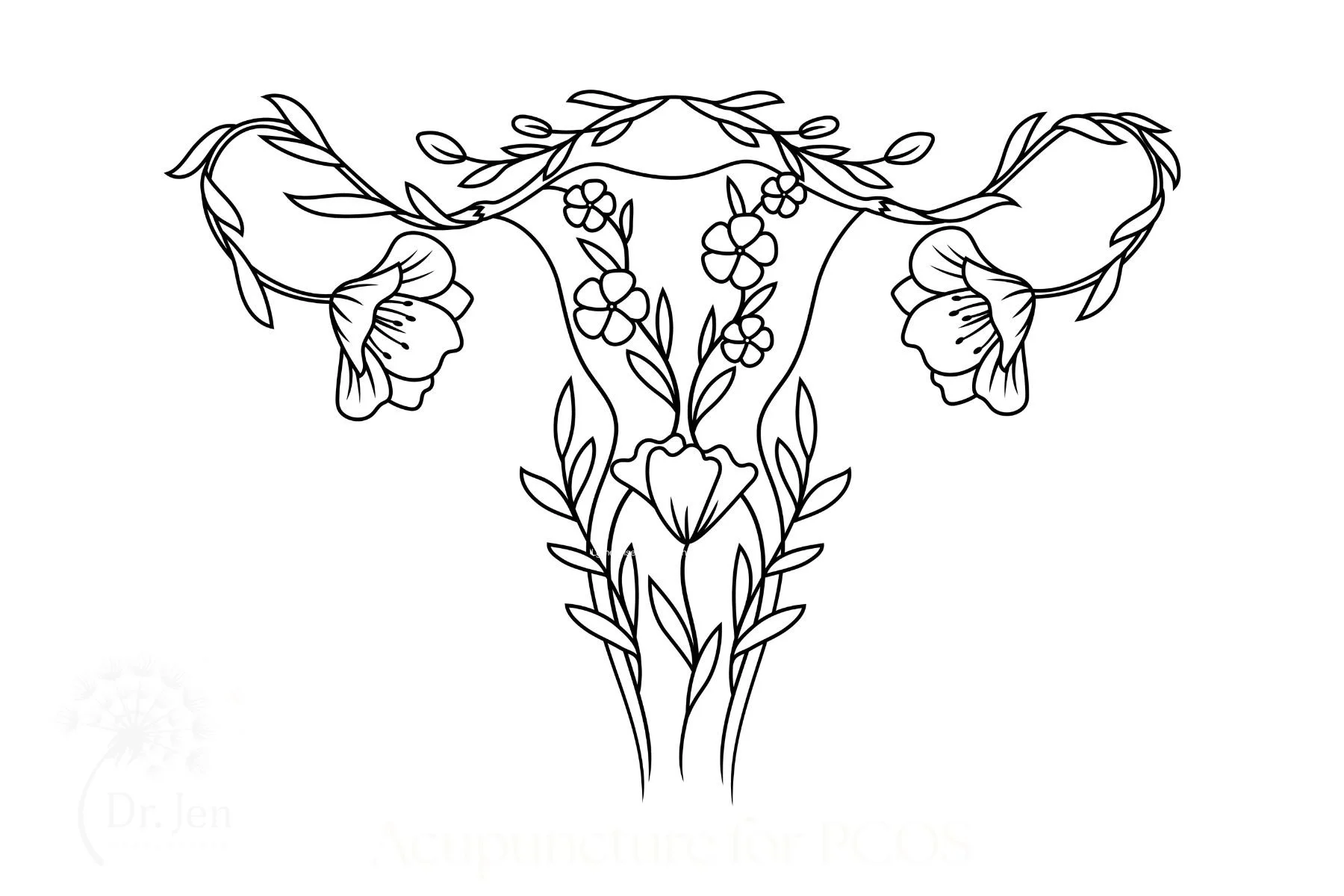Acupuncture for PCOS
Polycystic ovary syndrome (PCOS) is a common reproductive condition that leads to endocrine and metabolic disorders, as well as infertility in women. Many women with PCOS seek medical assistance during their reproductive years due to difficulties conceiving. However, numerous patients display clear clinical signs during their teenage years, including hyperandrogenism (elevated androgen levels that can cause acne, hair loss, and irregular or absent menstrual periods), irregular menstrual cycles, and various metabolic issues such as weight gain and insulin resistance.
Women can develop PCOS at any time after puberty. Most diagnoses occur in individuals in their 20s or 30s, especially when they are trying to conceive. Young women may be at a higher risk of developing PCOS if they have obesity or if others in their biological family have been diagnosed with the condition.
Signs and Symptoms of PCOS
Irregular menstrual cycles can manifest as longer or shorter durations, or missed cycles altogether. An imbalance in androgen hormones can lead to acne, scalp hair loss, and excessive facial hair growth, known as hirsutism.
Many individuals with PCOS may have larger ovaries with numerous follicles, or egg sac cysts, visible on an ultrasound.
PCOS is the most common cause of female infertility. Irregular or infrequent ovulation can lead to difficulties in conceiving.
Obesity, especially around the waist, is common, although not all women with PCOS experience weight gain.
Causes of PCOS
The exact cause of PCOS is unknown, but some research suggests that genetics may play a role. Diet and lifestyle factors are also important. A diet high in sugar can disrupt hormone balance, leading to insulin resistance and inflammation. Over time, these issues can negatively affect the ovaries and disrupt the menstrual cycle.
In Chinese Medicine, different root imbalances can contribute to symptoms of PCOS. These symptoms may include "damp-phlegm," which is characterized by excess fluid and cysts, as well as deficiencies in the Spleen and Kidney meridians. These deficiencies can affect the body's ability to regulate cortisol and metabolism.
Diet, lifestyle, constitution (genetic make-up), and emotional regulation all play an essential role in the root causes of PCOS. Acupuncture can aid in balancing hormones and insulin levels, regulating the nervous system, regulating emotions, increasing blood flow to the ovaries, and supporting weight loss.
Acupuncture for PCOS
Acupuncture may help alleviate symptoms of PCOS. Research indicates that it influences the body's regulatory systems, including the sympathetic nervous system (SNS) and hormonal balance. The effect of Acupuncture may be linked to the body's opioid system. Women who do not ovulate often exhibit high levels of β-endorphin in their blood and lower skin temperatures, which suggest increased activity of the SNS. Electroacupuncture (EA), which adds mild stimulation to the Acupuncture points, has been shown to reduce this SNS activity, potentially improving symptoms associated with PCOS (Budihastuti et al., 2019).
Herbal Medicine for PCOS
Chinese Herbal Medicine may assist in regulating insulin levels and easing the symptoms associated with PCOS. Research has shown that women with PCOS who underwent treatment with a particular herbal formulation noted changes in "572 genes and 73 metabolites, mainly influencing inflammation, insulin sensitivity, and metabolism" (Zhang et al., 2023). In experiments using rat models, the herbal formulation enhanced the fertility cycle and improved glucose tolerance. It supported ovarian health while decreasing oxidative stress and fostering positive signaling pathways (2023).
Some Guidelines for Patients with PCOS
Exercise
Regular exercise aids in weight loss, manages blood sugar and cortisol levels, and aids in emotional regulation. Start slow and gradually increase over time. If completely sedentary, begin with a 15-minute walk around the house.
30-minute daily walk
30-minute daily bike ride
Get a buddy and go for a hike, walk the beach, start a Yoga class, or join a gym.
Diet
Balance Blood Sugar levels by eating a protein with your carbohydrates. For example, when you eat fruit, have a handful of nuts as protein.
Reduce greasy, fried foods such as french fries, potato chips, and fried meats, as these add "damp-phlegm" to the body and exacerbate PCOS symptoms.
Add in more whole foods such as brown rice, non-starchy vegetables (leafy greens, peas, cauliflower), and lean proteins such as beans, legumes, fish, and chicken, as refined/packaged foods spike blood sugar levels.
Stress Management
Insight Timer is an excellent resource for guided meditations, aiding in stress relief, emotional regulation, and relaxation.
Take a warm bath to soothe the mind.
Work on getting a solid 8 hours of sleep. Shut down electronics one hour before bed.
Acupuncture and Herbal Medicine have profound and positive impacts for the management of PCOS. If you are interested in learning more, reach out to Dr. Jen for a Complimentary 30-minute office consultation.
* The information presented on this blog is intended for informational and educational purposes only. It should not be considered a substitute for professional medical advice, diagnosis, or treatment. Always consult your physician or another qualified healthcare provider if you have any questions regarding a medical condition or treatment.
References
Budihastuti, U. R., Melinawati, E., Sulistyowati, S., & Nurwati, I. (2019, December 1). Electroacupuncture effect on polycystic ovary syndrome to improve oocyte growth. Medical Acupuncture. https://pmc.ncbi.nlm.nih.gov/articles/PMC6918519/)
Zhang, Q., Ren, J., Wang, F., Li, M., Pan, M., Zhang, H., & Qu, F. (2023). Chinese herbal medicine alleviates the pathogenesis of polycystic ovary syndrome by improving oxidative stress and glucose metabolism via mitochondrial Sirtuin 3 signaling. Phytomedicine, 109, 154556. https://doi.org/10.1016/j.phymed.2022.154556



